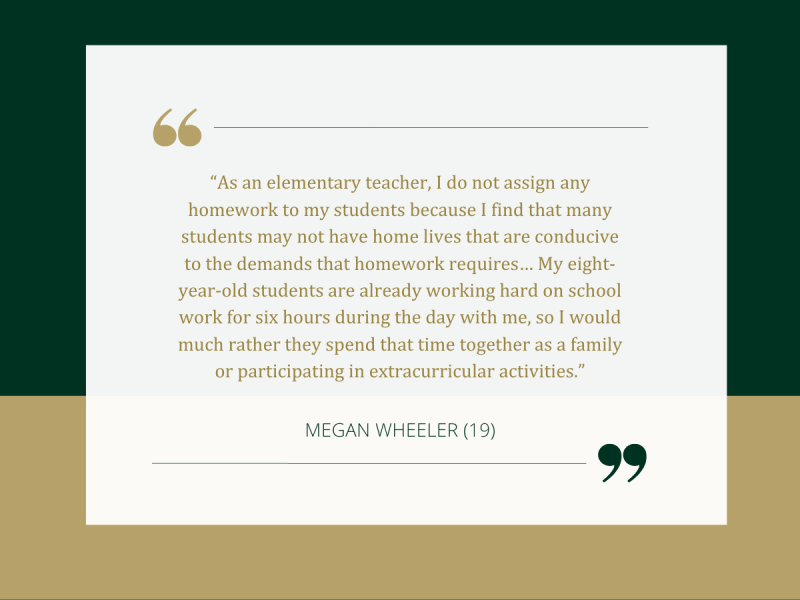
Giving homework is a standard practice in most educational facilities across all grade levels and locations. Homework is intended to further solidify concepts and practices that a student learns in class in their minds later at home. But that could all be changing.
Educators are now taking many different approaches to homework with more of an emphasis placed on the relevancy of the work to both the students’ age and learning level. Some educators are joining the anti-homework movement, and have seen positive results from giving little to no homework for students. However, with outside parties like parents and families getting more involved in the conversation around homework, it may be here to stay. The question is, should it be?
What is the history of homework?
For contemporary parents or guardians and their students, it might seem like homework has always been around. However, homework has actually been a widely debated topic since its inception in the 19th century. Horace Mann, among others, is credited with championing the idea of homework in the United States after touring German “Volksschulen (‘People’s Schools’)” while visiting the country.
As the idea of homework came across the Atlantic to America, it was quickly met with opposition and eventually a ban was placed on homework for any children under the age of 15 until 1917. When the United States and Russia entered the Cold War era, homework became relevant again as the United States placed emphasis on improving students’ knowledge to compete with other countries for success.
Various studies arguing both sides of the homework question have been released since then. The relevance of homework is now once again in question as educators and homeschooling parents try to understand the true purpose behind it.
Is homework still relevant?
Somewhere around 50% of educators still assign homework. However, this number might be bolstered due to parent involvement. Often, educators don’t want to assign homework or want to assign less homework, saving the time their students have at home for family bonding and other activities.
But many parents are uncomfortable with a lack of homework assignments for the following reasons:
- Parents feel like their children need homework to solidify concepts learned in the classroom.
- Some parents also advocate for the time management, organization, and structure that homework can teach children.
They will often complain to the teacher, forcing the teacher to provide homework of some kind. So while half of all educators are assigning homework, the number of educators who believe it’s necessary may actually be less since some teachers feel pressured to assign homework when they otherwise wouldn’t.
The relevance of homework when it is assigned is frequently up for debate because there are many nuances that go into the process of a student completing homework. When a teacher assigns homework they need to be aware of many things including:
- Student access to a reliable internet source and computer or tablet
- Student/parent dynamics at home
- Parent/parent dynamics at home
- Student accessibility levels
- Necessity to student learning
All of these factors play a role in how well the student will respond to homework. Other factors like grade level also play a role in the quality and quantity of homework being assigned. But beyond these factors, homework also needs to be thought out before it's assigned. To some extent, the relevancy of homework is determined by how well it’s been formulated by the teacher assigning it.
How much homework is too much?
The quantity of homework will vary greatly by grade level. Teachers will often operate by the “10-minute rule” which recommends that a child should be assigned 10 minutes of homework for every grade they’ve passed. So a fifth grader would have 50 minutes of assigned work.
However, homework can become overwhelming when a teacher hasn’t put the time into creating meaningful assignments that can be completed in a reasonable amount of time. Thus the feeling of “too much homework” is often conflated with poorly constructed homework. A positively constructed homework assignment will contain a few things:
- Work reviewing material that the student has already learned in class
- Work that involves professor feedback or has a clear purpose
- Work that can be finished in the time period appropriate for the age and grade level of the student
Why is homework important?
While many educators do not see much value in homework at the K–6 level, studies have shown that students in middle school or grades 7–12 do benefit from homework. Often this is because a student is learning more rigorous material and has a more fully developed brain that benefits from the reinforcement that homework provides.
Many teachers argue that homework for students is like practice for athletes: it reinforces concepts and the neural pathways a student has used during class. Beyond these benefits, homework can also teach students time management and organizational skills.
__________
Become who you are called to be
Pursue your purpose at PLNU.
__________
Should teachers still give homework?
Studies on the relevance of homework to actual success in the classroom are varied. One of the most comprehensive studies reinforces the idea that homework can have a positive impact if the teacher assigning it is doing so in the correct manner. In this case, the 2006 study conducted by Duke University psychology professor Harris Cooper, showed a positive correlation for students who were doing appropriate homework in higher grade levels. He stated that “a good way to think about homework is the way you think about medications or dietary supplements. If you take too little, they’ll have no effect. If you take too much, they can [hurt] you. If you take the right amount, you’ll get better.”
The study also revealed that the impact of homework went down if the student was in elementary school. Therefore, the decision for teachers to assign homework should be based on the grade level they are teaching and the general intensity level of their students. One PLNU alumna, Megan Wheeler (19), who is also a grade school teacher has found this to be a sound policy and practices it with her own students:
“As an elementary teacher, I do not assign any homework to my students because I find that many students may not have home lives that are conducive to the demands that homework requires…My eight-year-old students are already working hard on school work for six hours during the day with me, so I would much rather they spend that time together as a family or participating in extracurricular activities.”

Take the next steps to becoming an educator
Learning the ins and outs of properly constructed homework assignments can be a daunting task for rising educators, especially when the many types of student learning styles are taken into account. One of the best places to receive more instruction on how to assign the right kind of homework is in an education-specific degree program.
PLNU boasts many undergraduate and graduate-level options for all types of budding educators so you can continue your education while pursuing a worthwhile career. Find out more about these programs by visiting PLNU’s School of Education website.